中考英语语法句型转换专题
- 格式:doc
- 大小:87.50 KB
- 文档页数:9
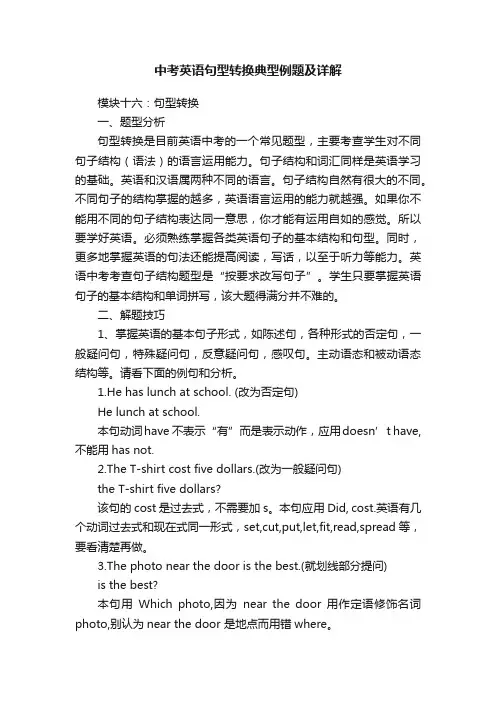
中考英语句型转换典型例题及详解模块十六:句型转换一、题型分析句型转换是目前英语中考的一个常见题型,主要考查学生对不同句子结构(语法)的语言运用能力。
句子结构和词汇同样是英语学习的基础。
英语和汉语属两种不同的语言。
句子结构自然有很大的不同。
不同句子的结构掌握的越多,英语语言运用的能力就越强。
如果你不能用不同的句子结构表达同一意思,你才能有运用自如的感觉。
所以要学好英语。
必须熟练掌握各类英语句子的基本结构和句型。
同时,更多地掌握英语的句法还能提高阅读,写话,以至于听力等能力。
英语中考考查句子结构题型是“按要求改写句子”。
学生只要掌握英语句子的基本结构和单词拼写,该大题得满分并不难的。
二、解题技巧1、掌握英语的基本句子形式,如陈述句,各种形式的否定句,一般疑问句,特殊疑问句,反意疑问句,感叹句。
主动语态和被动语态结构等。
请看下面的例句和分析。
1.He has lunch at school. (改为否定句)He lunch at school.本句动词have 不表示“有”而是表示动作,应用doesn’t have,不能用has not.2.The T-shirt cost five dollars.(改为一般疑问句)the T-shirt five dollars?该句的cost 是过去式,不需要加s。
本句应用Did, cost.英语有几个动词过去式和现在式同一形式,set,cut,put,let,fit,read,spread等,要看清楚再做。
3.The photo near the door is the best.(就划线部分提问)is the best?本句用Which photo,因为near the door 用作定语修饰名词photo,别认为near the door 是地点而用错where。
4.We have studied in this school for four years,(改为特殊疑问句)have you studied in this school?本句虽没有划线部分,但根据句子其他部分意思,可以看出是对for four years 进行提问,肯定用How long.5. Let’s go to the exhibition this afternoon.(改为反义疑问句)Let’s go to the exhibition this afternoon,?6.He could hardly see the words on the blackboard. (改为反义疑问句)He could hardly see the words on the blackboard, ?祈使句的反义疑问句,仅Let’s…句型用shall we,其他都用will you. 而一般疑问句改反义疑问句应注意,若句子的主要部分用肯定,附加部分用否定,反之则相反。
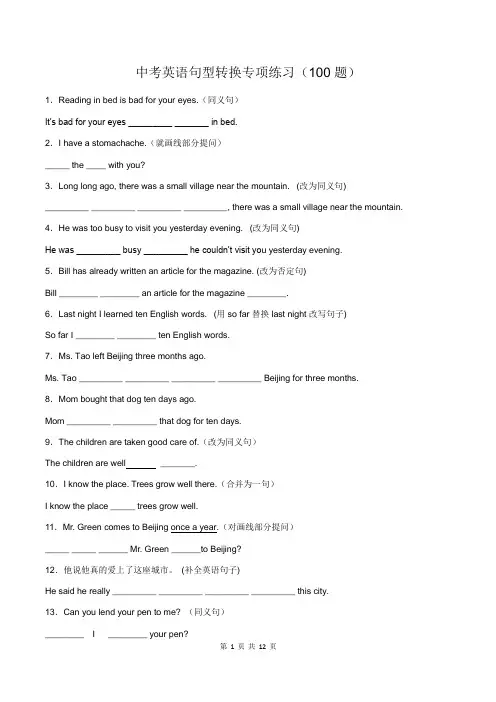
中考英语句型转换专项练习(100题)1.Reading in bed is bad for your eyes.(同义句)It’s bad for your eyes _________ _______ in bed.2.I have a stomachache.(就画线部分提问)_____ the ____ with you?3.Long long ago, there was a small village near the mountain. (改为同义句)_________ _________ _________ _________, there was a small village near the mountain. 4.He was too busy to visit you yesterday evening. (改为同义句)He was _________ busy _________ he couldn’t visit yo u yesterday evening.5.Bill has already written an article for the magazine. (改为否定句)Bill ________ ________ an article for the magazine ________.6.Last night I learned ten English words. (用so far替换last night改写句子)So far I ________ ________ ten English words.7.Ms. Tao left Beijing three months ago.Ms. Tao _________ _________ _________ _________ Beijing for three months.8.Mom bought that dog ten days ago.Mom _________ _________ that dog for ten days.9.The children are taken good care of.(改为同义句)The children are well _______.10.I know the place. Trees grow well there.(合并为一句)I know the place _____ trees grow well.11.Mr. Green comes to Beijing once a year.(对画线部分提问)_____ _____ ______ Mr. Green ______to Beijing?12.他说他真的爱上了这座城市。
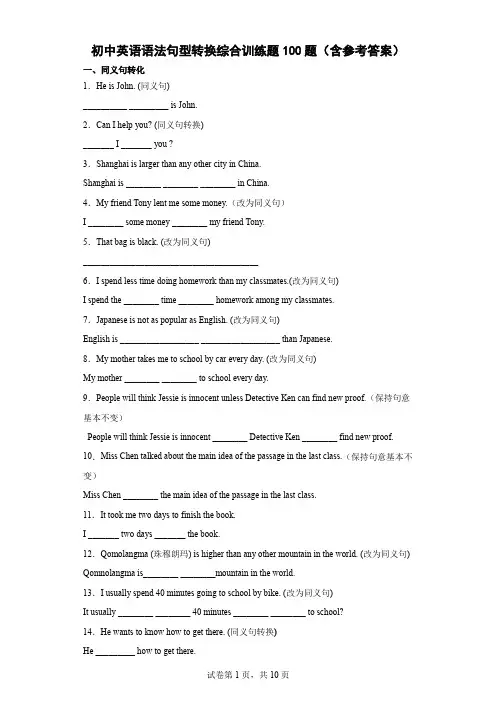
初中英语语法句型转换综合训练题100题(含参考答案)一、同义句转化1.He is John. (同义句)__________ _________ is John.2.Can I help you? (同义句转换)_______ I _______ you ?3.Shanghai is larger than any other city in China.Shanghai is ________ ________ ________ in China.4.My friend Tony lent me some money.(改为同义句)I ________ some money ________ my friend Tony.5.That bag is black. (改为同义句)________________________________________6.I spend less time doing homework than my classmates.(改为同义句)I spend the ________ time ________ homework among my classmates.7.Japanese is not as popular as English. (改为同义句)English is __________________ __________________ than Japanese.8.My mother takes me to school by car every day. (改为同义句)My mother ________ ________ to school every day.9.People will think Jessie is innocent unless Detective Ken can find new proof.(保持句意基本不变)People will think Jessie is innocent ________ Detective Ken ________ find new proof. 10.Miss Chen talked about the main idea of the passage in the last class.(保持句意基本不变)Miss Chen ________ the main idea of the passage in the last class.11.It took me two days to finish the book.I _______ two days _______ the book.12.Qomolangma (珠穆朗玛) is higher than any other mountain in the world. (改为同义句) Qomnolangma is________ ________mountain in the world.13.I usually spend 40 minutes going to school by bike. (改为同义句)It usually ________ ________ 40 minutes ________ ________ to school?14.He wants to know how to get there. (同义句转换)He _________ how to get there.15.Are these her keys? (同义句转换)Are these ________ ________?16.Remember to take your mobile phone with you when you go to the hill. (改为同义句) _________ _________ to take your mobile phone with you when going to the hill.17.I prefer science to any other subject.=I like science ____________ any other subject.18.If you don’t practice more, you won’t make progress in math. (同义句转化) Practice more, ________ you’ll make progress in math.19.You can’t be late for school!(改为同义句)___________ ___________ late for school!20.I don’t think the weather in Nantong is as dry as that in Beijing. (保持句意不变)I think the weather in Nantong is ________ that in Beijing.21.Health is always related to food and exercise. (同义句)Health ________ ________ ________ ________ food and exercise.22.Tan Dun wrote the music and he is a famous all over the world.(同义句转换) Tan Dun is a ________ ________.23.You can’t kill elephants for their ivory. (改写句子,句意不变)________ ________ elephants for their ivory.二、写出答句24.Is this your father?No, _____ _____. (否定回答)25.Is the computer on the table? (作肯定回答)________, ________ ________.26.Are the erasers on the desk? (作肯定回答)Yes, _________ _________.27.—Is it your pen?(补全否定答语)—No, ________ ________.28.Are these her keys?(作否定回答)No, ________ ________.29.Has Tom lived in Shanghai for ten years? (否定回答)_____________________________________________30.Are there any pencils in the pencil box? (作否定回答)_______, _______ _______.31.Isn’t that wonderful?(肯定回答)Yes, _______ _______.32.Does he walk to school? (作出否定回答)_________________________________________________________________________. 33.Can Sally play the drums? (做否定回答)No, ________ ________.34.—Is Mrs. Brown more popular than Mrs. Hand? (补全否定答语)—No, _________ _________.三、划线部分提问35.Every morning Uncle Liu runs for half an hour .(对画线部分提问)________ ________ ________ Uncle Liu ________ every morning?36.1 am going to have some bread and lemonade for breakfast this morning. (对划线部分提问)_________ are you going to _________ for breakfast this morning?37.Sandy seldom plays ball games after school. (对画线部分提问)________ ________ ________ Sandy ________ ball games after school?38.Miss King was cooking at home at eleven o’clock yesterday morning.(对画线部分提问) ________ Miss King doing at home at eleven o’clock yesterday morning?四、改写句子39.There will be over fifty people coming to the meeting. (改为一般疑问句)________ ________ ________ over fifty people coming to the meeting?40.I’m English. (改为一般疑问句并做肯定回答)—________ ________ English?—________, ________ ________.41.He has to wear a uniform on school days. (改为一般疑问句)________ he ________ to wear a uniform on schooldays?42.Is this your classmate ?(改为复数句)______ these your ______?43.I usually watch TV in the evening.I ________ TV yesterday evening.44.She is a new student.(改为一般疑问句并做否定回答)_________ she a new student?No, she ____________.45.My English teacher is a beautiful young woman.(Please change it into a Yes or No question. 变为一般疑问句。
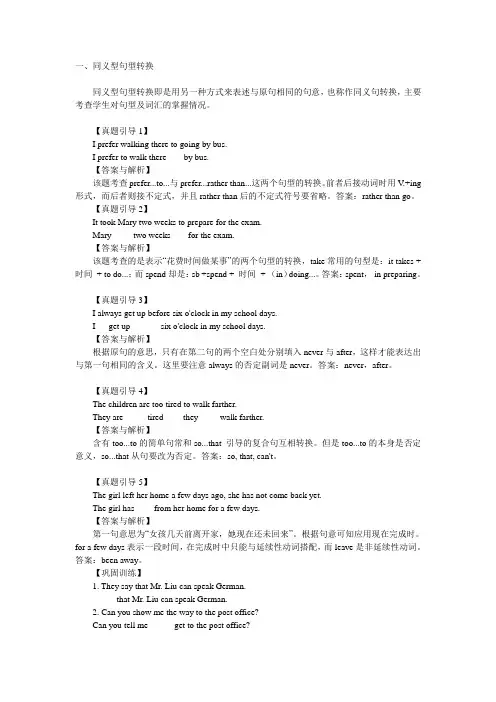
一、同义型句型转换同义型句型转换即是用另一种方式来表述与原句相同的句意,也称作同义句转换,主要考查学生对句型及词汇的掌握情况。
【真题引导1】I prefer walking there to going by bus.I prefer to walk there ___ by bus.【答案与解析】该题考查prefer...to...与prefer...rather than...这两个句型的转换。
前者后接动词时用V.+ing 形式,而后者则接不定式,并且rather than后的不定式符号要省略。
答案:rather than go。
【真题引导2】It took Mary two weeks to prepare for the exam.Mary ____ two weeks ___ for the exam.【答案与解析】该题考查的是表示“花费时间做某事”的两个句型的转换,take常用的句型是:it takes +时间+ to do...;而spend却是:sb +spend + 时间+ (in)doing...。
答案:spent,in preparing。
【真题引导3】I always get up before six o'clock in my school days.I __ get up ______ six o'clock in my school days.【答案与解析】根据原句的意思,只有在第二句的两个空白处分别填入never与after,这样才能表达出与第一句相同的含义。
这里要注意always的否定副词是never。
答案:never,after。
【真题引导4】The children are too tired to walk farther.They are_____ tired ____they ____ walk farther.【答案与解析】含有too...to的简单句常和so...that 引导的复合句互相转换。
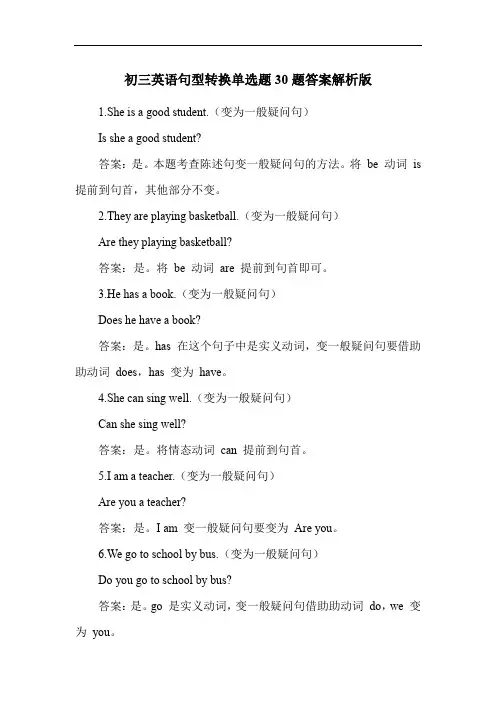
初三英语句型转换单选题30题答案解析版1.She is a good student.(变为一般疑问句)Is she a good student?答案:是。
本题考查陈述句变一般疑问句的方法。
将be 动词is 提前到句首,其他部分不变。
2.They are playing basketball.(变为一般疑问句)Are they playing basketball?答案:是。
将be 动词are 提前到句首即可。
3.He has a book.(变为一般疑问句)Does he have a book?答案:是。
has 在这个句子中是实义动词,变一般疑问句要借助助动词does,has 变为have。
4.She can sing well.(变为一般疑问句)Can she sing well?答案:是。
将情态动词can 提前到句首。
5.I am a teacher.(变为一般疑问句)Are you a teacher?答案:是。
I am 变一般疑问句要变为Are you。
6.We go to school by bus.(变为一般疑问句)Do you go to school by bus?答案:是。
go 是实义动词,变一般疑问句借助助动词do,we 变为you。
7.They like apples.(变为一般疑问句)Do they like apples?答案:是。
like 是实义动词,变一般疑问句借助助动词do。
8.He does his homework every day.(变为一般疑问句)Does he do his homework every day?答案:是。
does 是实义动词do 的单三形式,变一般疑问句借助助动词does,does 后的动词用原形。
9.She has breakfast at seven.(变为一般疑问句)Does she have breakfast at seven?答案:是。
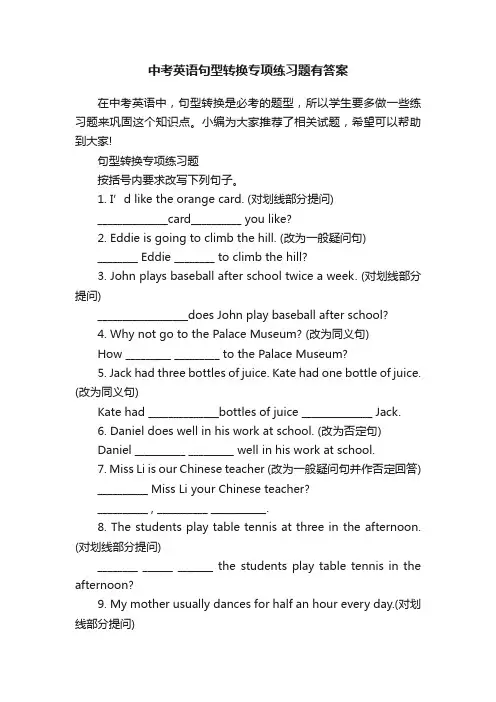
中考英语句型转换专项练习题有答案在中考英语中,句型转换是必考的题型,所以学生要多做一些练习题来巩固这个知识点。
小编为大家推荐了相关试题,希望可以帮助到大家!句型转换专项练习题按括号内要求改写下列句子。
1. I’d like the orange card. (对划线部分提问)______________card__________ you like?2. Eddie is going to climb the hill. (改为一般疑问句)________ Eddie ________ to climb the hill?3. John plays baseball after school twice a week. (对划线部分提问)__________________does John play baseball after school?4. Why not go to the Palace Museum? (改为同义句)How _________ _________ to the Palace Museum?5. Jack had three bottles of juice. Kate had one bottle of juice. (改为同义句)Kate had ______________bottles of juice ______________ Jack.6. Daniel does well in his work at school. (改为否定句)Daniel __________ _________ well in his work at school.7. Miss Li is our Chinese teacher (改为一般疑问句并作否定回答)__________ Miss Li your Chinese teacher?__________ , __________ ___________.8. The students play table tennis at three in the afternoon. (对划线部分提问)________ ______ _______ the students play table tennis in the afternoon?9. My mother usually dances for half an hour every day.(对划线部分提问)________ ________ ________ your mother dance every day? 10. We all have a good time going on picnics (改为近义句) We all _________ _________ going on picnics.11. Our lessons begin at eight fifteen. (改为近义句)Our lessons begin at _________ _________ ________ _________. 12. Sandy helps Kitty and Kitty helps Sandy too. (改为近义句) Sandy and Kitty help ________ _________.13. Jerry eats lunch at half past twelve. (改为一般疑问句)________ Jerry________ lunch at half past twelve?14. Xu Li is watching a football match now. (改为同义句)Xu Li is watching a football match_______ _______ _______. 15. My grandparents live in Australia.(就划线部分进行提问) ______ ______ your grandparents live?16. Let’s play football.(改为同义句)_____ ______ playing football?17. Our school has got two science labs.(改为同义句)_____ ______ two science labs in our school.18. We’ve already seen the film.(一般疑问句)______ you seen the film ______?19. They have been friends for ten years. (划线提问)_______ ______ have they been friends?20. Let’s go for a walk, _______ ________?(反意疑问句)21. Jim was very happy. He laughed and laughed.(合并成一句) Jim was__________ happy ___________he laughed and laughed.22. The boy is very honest.(感叹句)_______ ______ the boy is!23. That is my ruler. (改为复数句)_______ ______ my rulers.24. His last name is Green.(对划线部分进行提问)_______ ______ last name?25. He is her uncle.(对划线部分进行提问)_______ ______ is _______ ?26. She is my sister.(改为一般疑问句)_______ ______ your sister?27. The pen is red.(对划线部分进行提问)_______ ______ is the pen?28. Her mother often drives car to work. (对划线部分提问)________ ________ her mother often go to work?29. Danny does his homework at school. (改为否定句)Danny ________ ________ his homework at school.30. I can find some food in the fridge. (改为一般疑问句)________ you find ________ food in the fridge?31. I want to make some dumplings for supper. (改为同义句)I ________ ________ to make some dumplings for supper.32. My favourite colour is yellow. (对划线部分提问)________ favourite colour ________ yellow?33. She is going to have breakfast tomorrow morning. (改为同义句)She________ ________breakfast tomorrow morning.34. A: Will there be different kinds of resolutions in a new year? (作否定回答)B: No, ________ ________.35. We need one cup of yoghurt. (对划线部分提问)________ ________yoghurt do you need?句型转换练习题答案1. Which would2.Is going3.How often4.about going5.fewer than6. doesn’t do7. Is, No. she isn’t.8. What time do9. How long does 10. have fun11. a quarter past eight 12. each other 13. Does, eat 14. at the moment 15.Where, do16. What about 17. There, are 18. Have, yet 19. How long 20. shall we21. so, that 22.How honest 23. Those are 24. What’s his 25. Who; he26. Is she 27. What color 28. How does 29. doesn’t do 30. Can; any31. would like 32. Whose; is 33. will have 34. there won’t 5. How much。
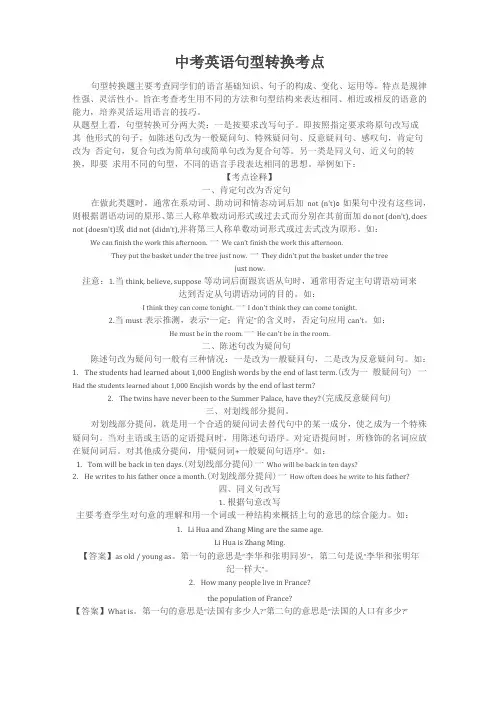
中考英语句型转换考点句型转换题主要考查同学们的语言基础知识、句子的构成、变化、运用等,特点是规律性强、灵活性小。
旨在考查考生用不同的方法和句型结构来表达相同、相近或相反的语意的能力,培养灵活运用语言的技巧。
从题型上看,句型转换可分两大类:一是按要求改写句子。
即按照指定要求将原句改写成其他形式的句子,如陈述句改为一般疑问句、特殊疑问句、反意疑问句、感叹句,肯定句改为否定句,复合句改为简单句或简单句改为复合句等。
另一类是同义句、近义句的转换,即要求用不同的句型,不同的语言手段表达相同的思想。
举例如下:【考点诠释】一、肯定句改为否定句在做此类题时,通常在系动词、助动词和情态动词后加not (n't)o如果句中没有这些词,则根据谓语动词的原形、第三人称单数动词形式或过去式而分别在其前面加do not (don't), does not (doesn't)或did not (didn't),并将第三人称单数动词形式或过去式改为原形。
如:We can finish the work this afternoon. 一We can't finish the work this afternoon.They put the basket under the tree just now. 一They didn't put the basket under the treejust now.注意:1.当think, believe, suppose等动词后面跟宾语从句时,通常用否定主句谓语动词来达到否定从句谓语动词的目的。
如:I think they can come tonight. 一I don't think they can come tonight.2.当must表示推测,表示“一定;肯定”的含义时,否定句应用can't。
如:He must be in the room. 一He can't be in the room.二、陈述句改为疑问句陈述句改为疑问句一般有三种情况:一是改为一般疑问句,二是改为反意疑问句。
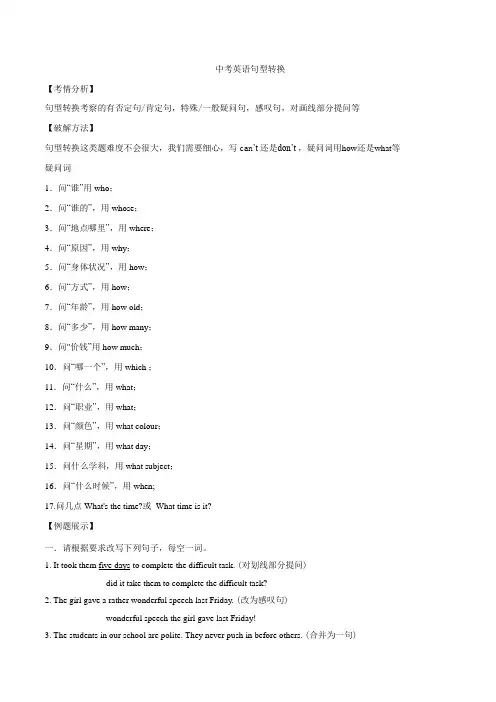
中考英语句型转换【考情分析】句型转换考察的有否定句/肯定句,特殊/一般疑问句,感叹句,对画线部分提问等【破解方法】句型转换这类题难度不会很大,我们需要细心,写can’t 还是don’t ,疑问词用how还是what等疑问词1.问“谁”用who;2.问“谁的”,用whose;3.问“地点哪里”,用where;4.问“原因”,用why;5.问“身体状况”,用how;6.问“方式”,用how;7.问“年龄”,用how old;8.问“多少”,用how many;9.问"价钱”用how much;10.问“哪一个”,用which ;11.问“什么”,用what;12.问“职业”,用what;13.问“颜色”,用what colour;14.问“星期”,用what day;15.问什么学科,用what subject;16.问“什么时候”,用when;17.问几点What's the time?或What time is it?【例题展示】一.请根据要求改写下列句子,每空一词。
1. It took them five days to complete the difficult task. (对划线部分提问)_____ _____ did it take them to complete the difficult task?2. The girl gave a rather wonderful speech last Friday. (改为感叹句)_____ _____ wonderful speech the girl gave last Friday!3. The students in our school are polite. They never push in before others. (合并为一句)The students in our school are _____ polite _____ push in before others.4. Suzy didn’t know when she would take a boat trip on the lake. (保持句意基本不变) Suzy didn’t know _____ _____ take a boat trip on the lake.5. Dr. Ma cured the old man’s serious eye problem two months ago. (改为被动语态) The old man’s serious eye problem _____ _____ by Dr. Ma two months ago.专题训练题组A一.请根据要求改写下列句子,每空一词。
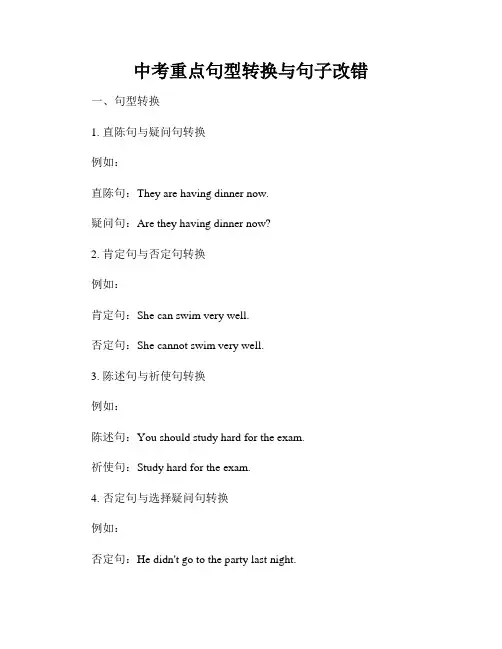
中考重点句型转换与句子改错一、句型转换1. 直陈句与疑问句转换例如:直陈句:They are having dinner now.疑问句:Are they having dinner now?2. 肯定句与否定句转换例如:肯定句:She can swim very well.否定句:She cannot swim very well.3. 陈述句与祈使句转换例如:陈述句:You should study hard for the exam.祈使句:Study hard for the exam.4. 否定句与选择疑问句转换例如:否定句:He didn't go to the party last night.选择疑问句:Did he go to the party last night?5. 特殊疑问句转换为陈述句例如:特殊疑问句:What is your favorite color?陈述句:My favorite color is blue.二、句子改错(以下为例句,具体句子改错内容可自行拓展)1. We will go to the park after we finished our homework.改正:We will go to the park after we finish our homework.2. The girl is very kind and always help others.改正:The girl is very kind and always helps others.3. What interesting news did you hear from your friend?改正:What interesting news did you hear from your friends?4. He told me that don't forget to bring my umbrella.改正:He told me not to forget to bring my umbrella.5. Are you going to visit your grandparents or go shopping this weekend?改正:Are you going to visit your grandparents or are you going shopping this weekend?6. The weather is very nice, so we decided to take a walk and went to the park.改正:The weather is very nice, so we decided to take a walk and go to the park.7. Can you let me know where is the nearest bus stop?改正:Can you let me know where the nearest bus stop is?8. My brother said if he has enough time, he will go to the party with us.改正:My brother said if he has enough time, he would go to the party with us.三、总结以上是中考重点句型转换与句子改错的内容。
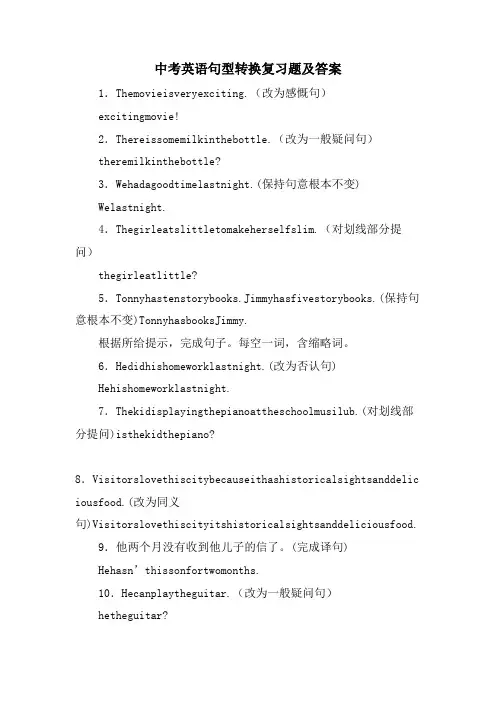
中考英语句型转换复习题及答案1.Themovieisveryexciting.(改为感慨句)excitingmovie!2.Thereissomemilkinthebottle.(改为一般疑问句)theremilkinthebottle?3.Wehadagoodtimelastnight.(保持句意根本不变)Welastnight.4.Thegirleatslittletomakeherselfslim.(对划线部分提问)thegirleatlittle?5.Tonnyhastenstorybooks.Jimmyhasfivestorybooks.(保持句意根本不变)TonnyhasbooksJimmy.根据所给提示,完成句子。
每空一词,含缩略词。
6.Hedidhishomeworklastnight.(改为否认句)Hehishomeworklastnight.7.Thekidisplayingthepianoattheschoolmusilub.(对划线部分提问)isthekidthepiano?8.Visitorslovethiscitybecauseithashistoricalsightsanddelic iousfood.(改为同义句)Visitorslovethiscityitshistoricalsightsanddeliciousfood.9.他两个月没有收到他儿子的信了。
(完成译句)Hehasn’thissonfortwomonths.10.Hecanplaytheguitar.(改为一般疑问句)hetheguitar?11.It’stenfor tynow.(对画线部分提问)isitnow?12.Sheusuallytakesthebustoschool.(改为同义句)Sheusuallygoestoschool.13.Youcan’truninthehallways.(改为祈使句)inthehallways!14.ShewantstojointheEnglishclub.(对画线部分提问) clubshewanttojoin?15.IcansingEnglishsongs.(变一般疑问句) singEnglishsongs?16.Sheusuallygetsupatsix.(就划线部分提问) doessheusuallygetup?17.Jackgoestoschoolbybike.(就划线部分提问) Jackgotoschool?18.CanLilyandLucyswim?(作否认答复),they.19.school/your/from/it/is/howfar/home/to/?(连词成句)20.Ieatdinnerintheevening.(就画线部分提问)youeatdinner? 21.Theygethomeat7:30pm.(改为同义句)。
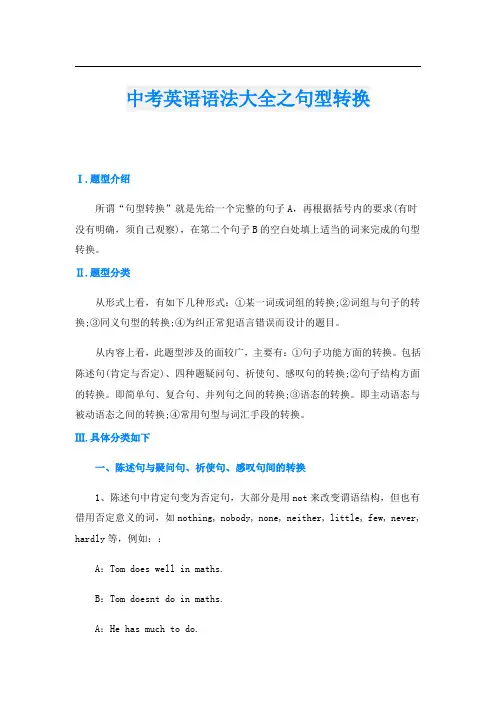
中考英语语法大全之句型转换Ⅰ.题型介绍所谓“句型转换”就是先给一个完整的句子A,再根据括号内的要求(有时没有明确,须自己观察),在第二个句子B的空白处填上适当的词来完成的句型转换。
Ⅱ.题型分类从形式上看,有如下几种形式:①某一词或词组的转换;②词组与句子的转换;③同义句型的转换;④为纠正常犯语言错误而设计的题目。
从内容上看,此题型涉及的面较广,主要有:①句子功能方面的转换。
包括陈述句(肯定与否定)、四种题疑问句、祈使句、感叹句的转换;②句子结构方面的转换。
即简单句、复合句、并列句之间的转换;③语态的转换。
即主动语态与被动语态之间的转换;④常用句型与词汇手段的转换。
Ⅲ.具体分类如下一、陈述句与疑问句、祈使句、感叹句间的转换1、陈述句中肯定句变为否定句,大部分是用not来改变谓语结构,但也有借用否定意义的词,如nothing, nobody, none, neither, little, few, never, hardly等,例如::A:Tom does well in maths.B:Tom doesnt do in maths.A:He has much to do.B:He has nothing to do.A:All of my classmates like art.B:None of my classmates likes art.2、改为疑问句。
根据上下句的结构和词的减少,来判断变为哪一种形式的疑问句。
例如:A:My brother often has breakfast at school.B: Does your brother often have breakfast at school?A:Toms already weak in English.B:Toms already weak in English, isnt he ?A:The red light changes every two minutes.B:How often does the red light change?3、改为感叹句。
初中英语语法句型转换专题综合训练100题含答案一、改写句子1.This is my pencil. (变为一般疑问句)______________________________________________________________________ 2.We can finish the work in two hours. (改为一般疑问句)_________ __________ finish the work in two hours?3.I live in China and I speak Chinese. (用she作主语,改写句子)She ________ in China and she ________ Chinese.4.Some oranges are on the tree.________ orange ________ on the tree.(改为单数形式)5.Does Mary have three ping-pong bats?(改为陈述句)________________6.My father was reading a newspaper from four to five yesterday afternoon. (改为一般疑问句)________your father ________ a newspaper from four to five yesterday afternoon? 7.They have long legs. (改为一般疑问句并做否定回答)________ they ________ long legs? ________, ________ ________.8.You must not drink coffee.(改为祈使句)______________________________________ coffee.9.These students are going to help some old men with housework. (改为一般疑问句)________________10.It is important for kids to imagine freely. (改为感叹句)________ ________ it is for kids to imagine freely!11.Exercising regularly helps us keep fit.(改为一般疑问句)________ exercising regularly ________ us keep fit?12.They have new bikes at home. (用the girl改写)________ ________ ________ new bikes at home.13.China’s women’s soccer team won a ticket to Tokyo Olympics.(改为一般疑问句)________ China’s women’s soccer team ________ a ticket to Tokyo Olympics?14.I have a gold watch.(改为一般疑问句)_____________________________________15.We’re going to travel to Beijing by train.(改为一般疑问句)________ ________ going to travel to Beijing?16.I watch TV at seven every day.(改为第三人称she作主语)She ________ ________ at seven every day.17.The poor couple lived a very happy life together. (改为感叹句)________________ happy life the poor couple lived together!18.You can’t sing in the library.(改为祈使句)______ _______in the library.19.Sam visits his grandfather every week.(改为一般疑问句)________ Sam ________ his grandfather every week?20.They were busy watching the football match at that time.(改为一般疑问句)________ they ________ ________ the football match at that time?21.I have a pen pal in England.(改为一般疑问句,并作肯定回答)______________________________?Yes, ________________.22.There is a library in my neighborhood.(改为一般疑问句)______ ______ a library in your neighborhood?23.The dog put the meat under the tree.(改为一般疑问句)________ the dog ________ the meat under the tree?24.Those are orange skirts.(变单数句)________ ________ orange ________.25.We use the camera to take photos.(改为被动语态)The camera ________ ________ to take photos by us.26.There is some water in the bottle. (改为一般疑问句)________ there ________ water in the bottle?27.He used to play the guitar. (改为一般疑问句,并作肯定回答)________ he ________ to play the guitar? Yes, he ________.28.You will get a fine. You park your car in the wrong place.(合并成一个句子) You ________ get a fine ________ you park your car in the wrong place. 29.Kate has a new English dictionary. (改为一般疑问句)________ ________ ________ a new English ________?30.We have cleaned the classroom. (改为一般疑问句)________ you _________ the classroom?31.He was sleeping. The telephone rang. (合并为一句)He was sleeping ____ the telephone rang.32.Bill can play the erhu and the dizi. (改为否定句)Bill ________ play the erhu________the dizi.33.Mr. Smith was watching TV in the living room at 7:00 yesterday.否定句:________________疑问句:________________34.The police station is on Bridge Street.(改为一般疑问句)________ the police station ________ Bridge Street?35.Could you please hold the ball?(改为否定句)Could you please ______________ the ball?36.Your advice is very useful.(改为感叹句)__________ __________ your advice is!37.I like salad.(变成一般疑问句)________ ________ like salad?38.He hurt himself badly yesterday. (改为一般疑问句)______ he______ him badly yesterday?39.Jenny eats two apples every day._______________________________________40.I'm going to get up at 6:30 tomorrow.(改一般疑问句)________ ________ ________ to get up at 6:30 tomorrow?41.Robin took a bus to Shanghai Museum yesterday(改为一般疑问句)____________ Robin ___________ a bus to Shanghai Museum yesterday? 42.The girl is beautiful.(改为感叹句)_________ _________ the girl is !43.You shouldn’t shout back to your parents! ( 改为祈使句)________________ back to your parents!44.“Did Mary clean the classroom yesterday?” Mr. Hu is asking.(改为宾语从句)Mr. Hu is asking ________ Mary ________ the classroom yesterday.45.It’s a great book.(改为感叹句)________ ________ great book it is!二、同义句转化46.Don’t worry about your son. He will be OK this evening. (改为同义句) Don’t ________________ your son. He will be OK this evening.47.His favorite subject is English. (同义句)He ________ English ________.48.The bike costs Sally 2,000 yuan. (改为同义句)Sally ________ 2,000 yuan for the bike.Sally ________ 2,000 yuan on the bike.49.What is he like?(改为同义句)________ _________ he ________ ________?50.Don’t smoke in public. Otherwise, you will be fined. (改为同义句)________ ________ smoke in public, you will be fined.51.He spends half an hour going to school by bus every day.=It _______ _______half an hour________________ to school by bus every day. 52.You mustn’t talk to your mother like that. (改为同义句)________ ________ to your mother like that53.What beautiful flowers they are! (保持句意基本不变)_________ __________ the flowers are!54.Whose magazine is it?(改为同义句)________ ________ the magazine ________ ________.55.I think dancing is more exciting than swimming.I think swimming is __________ __________ than dancing.56.Put the milk into the fridge, or it will go bad.(保持句意基本不变)The milk will go bad _____ you _____ put it into the fridge.57.Health is always related to food and exercise. (同义句)Health ________ ________ ________ ________ food and exercise.58.His brother is so short that he can’t reach the apple on the tree. (改为同义句) His brother isn’t _______ _______to reach the apple on the tree.59.Jack came back home late yesterday.(改为同义句)Jack ________ home late yesterday.60.If you run out of your money, you can’t buy the book.(改为同义句)If your money ________ ________, you can’t buy the book.61.Your date of birth decides your star sign.(改为同义句)Your star sign________________your date of birth.62.The stone is very heavy; he can’t move it himself. (改写句子,句意不变)The stone is ________heavy ________he can’t move it himself.63.The Olympic Games take place in an important city once every four years. (保持句意基本不变)The Olympic Games ________ in an important city once every four years.64.This book is not as interesting as that one. (保持句意基本不变)This book is _______ interesting _______ that one.三、句型转换根据所给提示,完成句子,每空一词,含缩略词。
专题三、句型转换【知识盘点】句型转换这一题型是先给出一个句子,然后再给出一个包含几个空白处的句子,要求根据括号内的具体要求在第二句的空白处填入适当的词来完成。
它有完全的句式转换和句子中某一部分或几部分的转换。
该题型主要考查同学们的语言基础知识及句子结构的构成、变化、运用等。
其特点是规律性强、灵活性小,旨在考查考生用不同的句型结构来表达相同、相近或相反的语意的能力,训练灵活运用语言的技巧。
【命题规律】从题型上看,句型转换可分为两大类:一是按要求改写句子。
即按照指定要求将原句改写成其他形式的句子,如肯定句改为否定句,陈述句改为一般疑问句、特殊疑问句、反意疑问句、感叹句,对划线部分提问等。
另一类是同义句、近义句的转换,即要求用不同的句型,不同的语言手段表达相同的思想。
【命题趋势】从近年来的考题趋势来看,句型转换从单纯测试语法知识向改变句子结构填空,填词后使句意不变或与要求相符的方向发展。
其中许多属于常用句型。
【解题技巧】一、肯定句改为否定句1. 改变谓语结构在系动词be, become, feel, smell等,助动词be, have, do 等以及情态动词can, may, should等后加not。
如果句子的谓语中不是以上这些词,而是行为动词,则相应地将动词的原形,第三人称单数或过去式变为否定形式。
如:He has seen the film before.→He hasn’t seen the film before.He will write the book in two months.→He won’t write the book in two months.He does his homework in the evening.→He doesn’t do his homework in the evening.2. 用含否定意义的词(如never, nothing, nobody, none, neither, little, few等)。
中考英语句式转换专题复习含解析一、选择题1.The self-driving plane proves to be useful in many ways. __________ object it is!A.How smart B.What a smart C.How boring D.What boring 2._______ wonderful news program we are watching!A.What B.How C.What a D.How a3.________to see you here! I thought you were not supposed to come back until tomorrow. A.What surprise B.What a surprise C.How surprise D.How a surprise 4.Summer is coming. ___________perfect time to _________!A.How a; go swimming B.What a; go swimmingC.How; swimming D.What; swimming5.—The writer can write good articles .Look at this ,_______ exciting news report!A.What B.How a C.What an D.How6.________ exciting news it is! We can visit Shanghai Disneyland in a month.A.How B.What C.What a D.What an7.________ wonderful news programme we are watching!A.What B.How C.What a D.How a8.— Did you take part in Dayang Bay Yancheng Marathon on April 21?— Yes. ________ hard work!A.What a B.What C.How a D.How9.—The sky is blue and I can smell the Mowers.一 great fun it is to go spring outing!A.How a B.How C.What a D.What 10.—The young man saved an old lady out of the Yangtze River.—__________ great courage he showed!A.What a B.What C.How a D.How11.—It’s raining now and I’ll give you a ride to school.— What a great ______!A.rule B.order C.news D.offer12.______ great fun Simon has making a snowman in the yard!A.What B.What a C.How D.How a13.________ terrible the storm was! Many people got hurt on their way home.A.How a B.What a C.What D.How14.________ time flies! We will finish our junior high school life soon.A.What B.What a C.How D.How a 15.—The self-driving plane proves to be useful in many ways.—________ smart the invention is!A.What B.How C.What a D.How a16.―We should learn from the doctors and nurse s ________ help to treat the patients in Hubei. ―Yes. ________ brave they are!A.who; What B.which, What C.which, How D.who, How 17.The robot proves to be useful in many ways. ________ smart the invention is!A.What B.What a C.How D.How a 18.— _________ crowded Guanqian Street is!— Yes, because the number of people has kept _________ greatly since 1990.A.What; rising B.How a; raising C.What; raising D.How; rising 19.—Notre Dame de Paris(巴黎圣母院) caught fire on April 15,2019.—____________terrible!A.How B.How a C.What D.What a 20.—Steve, did you eat Beijing Duck during your visit to Beijing?—Sure ! ________ delicious food!A.What a B.How a C.What D.How21.— ________ moving person Zhang Dingyu is! He devoted himself to treating and helping patients in Wuhan.—Yes, he won the award for Moving China last year.A.How a B.How C.What a D.What22.I found cooking________ great fun. ________ fantastic time we had cooking all kinds of delicious food during the long winter holiday!A.so, What a B.such, How C.so a, What D.such, What a 23.The self-driving plane proves to be useful in many ways. ____ smart invention it is! A.What a B.How a C.What D.How24.--__________wonderful China Dinosaurs Park is!--Yes, it is the pride of the people in Changzhou.A.What B.How C.What a D.How a25._______ awful the weather is! I’m afraid we have to cancel our sports meeting.A.What an B.What C.How an D.How26.________ unusual music he is playing! All of us are losing ourselves in it.A.How B.What a C.What D.How a 27.— The sky is blue and I can smell the flowers.— ________ great fun it is to go spring outing!A.How B.How a C.What D.What a28.________ role she played in the movie! That’s why she has a lot of fans.A.How an interesting B.How interesting C.What an interesting D.What interesting 29.—It's reported that Music and Art will enter the Entrance Examination for the High School.— big news! So it's important for students to learn them well.A.What B.What a C.How D.How a30.________ great fun we have had in the junior middle school!A.What B.What a C.How D.How a31.________great fun it is to be with the humorous girl!A.What B.What a C.How D.How a32.—The Long March 5 called “Fat 5” was launched(发射) on Dec. 27, 2019.— __________ exciting event!A.What a B.How C.How an D.What an33.__________ you offered him!A.How useful advice B.What a useful adviceC.How a useful advice D.What useful advice34.—Do you know that people in quite ________ few places in China witnessed on Sunday the most wonderful event of the year, an annular solar eclipse(金边日环食)?—What _____ exciting news! It’s reported the whole eclipse lasted about three and a half hours. A.a; an B.the; / C.a; / D.the; an 35.What _______ fine weather it is!A.a B.an C.the D./36.- How was your voluntary work in the countryside?- Oh, __________ exciting experience! I’Il never forget it!A.what B.what an C.how D.how a37.________ he has provided for us!A.What a useful advice B.What useful suggestionsC.How useful the advice D.How useful suggestions38.– Our classmates are going to Rose Garden after the exam.–______ exciting idea!A.What B.How C.What an D.How an39.________and amazing progress our country has made in the last few years!A.How a great B.How great C.What a great D.What great 40.— _______ terrible mess you have made!—Sorry, I will tidy it up at once.A.What B.What a C.What an D.How【参考答案】一、选择题1.B【详解】句意:事实证明,自动驾驶飞机在许多方面都很有用。
初三英语句型转换试题答案及解析1.【1】It has been in use since 1998. (划线提问)it in use?【答案】How long has been【解析】对since 1998.提问,可知对时间段提问,故此处为How long has been。
【2】I don’t like winter because it is too cold.(划线提问)like winter?【答案】Why don’t you【解析】对because it is too cold.提问,是对原因提问,故此处用疑问词why。
故此处为Why don’t you。
【3】To be a good student is quite difficult. (改为同义句)difficult to a good student.【答案】It’s, be【解析】根据句型It’s +形容词+to do sth.可知动词不定式To be a good student做真正的主语,it是形式主语,故第一空为It’s ,第二空为be。
【4】Daniel bought a new printer. (改为被动语态)A new printer Daniel.【答案】was bought by【解析】根据谓语bought可知此处的被动语态用过去时的被动语态,因为主语是A new printer ,第三人称单数形式,故此处为was bought by。
【5】I spent much time buying books. (改为同义句)It me much time books.【答案】took to buy【解析】sb. spent sometime doing sth.="It" took sb. to do sth.故第一空为took ,第二空和第三空分别为to buy。
【考点】句型转换。
2.【1】 I used to be interested in playing baseball.(改为一般疑问句)_______ you _________ to be interested in playing baseball?【答案】Did, use【解析】根据上文可知句意:你过去对打棒球感兴趣吗?used to do sth过去常常做某事,是实意动词的一般过去式,变一般疑问句要借助助动词did, used要还原成原形。
中考英语句型转换练习班级考号姓名总分1.—Did he eat anything delicious in that restaurant yesterday?(根据句意回答)—No, he ________ ________ delicious and the service was bad.2.—Will you leave for Beijing next week?(作否定回答)—No, ________ ________.3.I’d like to learn swing dance.(对划线部分提问)_______ _______ _______ dance would you like to learn?4.My mother surfs the Internet three times a week.(对画线部分提问)_______ _______ _______ your mother surf the Internet?5.I watched TV yesterday evening.(对画线部分提问)________ ________ you ________ yesterday evening?6.Sam usually reads storybooks in his spare time. (对划线部分提问)______ ______ Sam usually ______ in his spare time?7.The one with a book and a long ruler in hand is our math teacher.(对划线部分提问)________ ________is your math teacher?8.Li Ling calls her parents once a week. (对画线部分提问)________ ________ does Li Ling call her parents?图片9.My brother likes playing soccer because it’s exciting. (对划线部分提问)_______ _______ your brother _______ playing soccer?10.She doesn’t mind sitcoms. (对划线部分提问)________ does she ________ of sitcoms?11.My father plans to visit the West Lake. (对画线部分提问)________ does your father ________ ________ ________?12.We are going to the city by train.(对画线部分提问)________ ________ ________ going to the city?13.My mother is going to work in a supermarket. (对画线部分提问)________ ________ your mother going to work?图片14.They are going to leave next Tuesday.(对划线部分提问)________ ________they going to leave?15.I think the weather will be fine tomorrow. (对画线部分提问)________ do you think the weather ________ ________ ________ tomorrow?16.My mother will be back in three days.(对画线部分提问)________ ________ will your mother be back?17.You should cook it for 30 minutes. (对画线部分提问)________ ________ ________ I cook it?lie ate one orange this afternoon. (对画线部分提问)________ ________ ________ did Millie eat this afternoon?19.Linda needs two spoons of yogurt. (对画线部分提问)________ ________ yogurt ________ Linda ________?20.I will play volleyball if it is fine tomorrow. (对画线部分提问)____ ____you_____if it is fine tomorrow?21.They can come to our school on Tuesday. (对画线部分提问)____ ____ they come to your school?22.David stared at the book The Universe in a Nutshell yesterday. (改为一般疑问句)_________ David _________ at the book The Universe in a Nutshell yesterday?23.The teacher told us just now. The sun is bigger than the earth.(改为含宾语从句的复合句)The teacher ________ us just now that the sun ________ bigger than the earth.24.Li Ming is playing basketball now.(用often改写句子)Li Ming_______ _______basketball.25.They bought something special in the supermarket.(改为一般疑问句)________ they________ ________ special in the supermarket?26.James Harden seldom argues with his classmates.(改为反意疑问句)James Harden seldom argues with his classmates, __________ __________?27.She stayed there for a week.(改为否定句)She ________ ________ there for a week.28.He plays soccer and goes swimming on weekends.(改为否定句)He ______ ________ soccer ________ ________ swimming on weekends.29.Huang Lei likes sports , and Larry likes sports , too.(合并为一句)________ Huang Lei ________ Larry like sports .30.I like the city better than the country.(改为选择疑问句)__________ do you like __________, the city or the country?31.I think my dress is the same as Rita’s. (改为反义句)I think my dress is ________ ________ Rita’s.32.I have something to tell you. (改为一般疑问句)________ you have ________ to tell me?33.Your sister sent me a message on the mobile phone. (改为否定句)Your sister ________ ________ a message to me on the mobile phone.34.We visited the Palace Museum last weekend. (用next Sunday改写句子)We are ________ to ________ the Palace Museum next Sunday.35.I am going to make some dumplings tomorrow morning. (改为一般疑问句)________ you going to make ________ dumplings tomorrow morning?36.The work will be finished in two hours.(改为—般疑问句)________the work ________ ________ in two hours?37.Do you know? Will we hold an English party this term? (改为含宾语从句的复合句)Do you know ________ we ________ an English party this term?38.The Greens will go to Hainan Island for a vacation.(改为一般疑问句)________ ________ ________ ________ to Hainan Island for a vacation?39.I think there will be more pollution.(改为否定句)I ________ think there ________ be more pollution.40.The students of Class 2 will see the animals at the zoo this Sunday afternoon.(改为否定句)The students of Class 2________ ________ the animals at the zoo this Sunday afternoon.41.Will you please come here on time? (改祈使句)________ ______ on time, please.42.Bill put some fruit in the fridge just now. (改为否定句)Bill ________ ________ any fruit in the fridge just now.43.The food is very delicious. (改为感叹句)________ ________ the food is!44.You mustn’t smoke here. (改为祈使句)________ ________ here, please.45.Pour some water into the glass. (改为否定句)________ ________ ________ water into the glass.46.Put the bananas and the milk in the blender. (改为否定句)________ put the bananas ________ in the blender.47.The doctor often adivses us that we should be active in sports.(改为祈使句)“_______ _______ in sports.” the doctor often says to us.48.They are going to do more practice. They will win the match. (改为含有if条件句的复合句)______ they ______ more practice, they______ ______ the match.49.If you study hard, you’ll catch up with others. (改为并列句)____ ____, or you’ll fall behind others.50.Jane has to do her homework first.(改为否定句)Jane ________ ________ to do her homework first.51.Alice studied for a math test last night. (改为否定句)Alice ________ ________ for a math test last night.52.I can go to the zoo with you after lunch.(改为一般疑问句)________ ________ ________ to the zoo with me after lunch?53.Does Zhang Juan have to go to school now? (改为陈述句)Zhang Juan ____ ____ go to school now.54.They will go to Beijing on vacation next week. They will have enough time.(合并为含if的复合句)They will go to Beijing on vacation next week ________ they ________ enough time.55.If you wear jeans, we won’t let you in.(改为祈使句)________ ________ ________, or we won’t let you in.56.She will go to the cinema. It won’t snow tomorrow.(用if合并为一句)She ____ ____ to the cinema if it ____ ____ tomorrow.57.He asked me to go to Hefei with him. (改为否定句)He asked me ________ ________ ________ to Hefei with him.58.Please bring some masks to my house. (改为否定句)________ ________ any masks to my house please.59.The Muji(无印良品) pen cost me 99 yuan. (保持原句意思不变)I __________ 99 yuan __________ the Muji(无印良品) pen.60.Why don’ t you tell him the news?(改为同义句)________ ________ tell him the news?61.Dean didn't t say anything at the meeting.(改为同义句)Dean________ ________ at the meeting.62.To lie on the beach is relaxing. (变为同义句)______ ___________ to lie on the beach .63.Town Cinema is cheaper than any other cinema in our town .(变为同义句)Town Cinema is______ ___________ in our town .图片64.What do you think of the 2018 Spring Festival Gala?(变为同义句)______ do you ______ the 2018 Spring Festival Gala?65.It is about 15 minutes’walk from here to school.(变为同义句)It is about 15 ______ ______ ______ from here to school.66.This book is not as interesting as that one. (保持句意基本不变)This book is _______ interesting _______ that one.67.The baby sleeps over ten hours a day. (改为同义句)The baby sleeps ______ ______ ten hours a day.68.English isn’t as easy as history.(改为同义句)English is ___________ ___________ ________ history.69.They both study very hard.(改为同义句)__________ __________ them study very hard.70.Lily sings better than Lucy. (改为同义句)Lucy ____________ sing ____________ well as Lily.71.I’m 13 years old, and she is 13 years old, too.(改为同义句)We ________ ________ 13 years old.72.Jim is 13 and Mike is 17. (改为同义句)Mike is 4 years ________ ________ Jim.73.Lin Hui asked me, “Do you help your parents with the housework?”(改为同义句)Lin Hui asked me ____I ____ my parents with the housework.74.Miss Li is popular in our class. Mr. Wang is more popular. (同义句转换)Mr. Wang is __________ popular __________ Miss Li.75.My painting isn’t as beautiful as Millie’s. (改为同义句)My painting is ________ ________ than Millie’s.76.This hotel’s service is friendlier than any other Hotel in town. (改为同义句)This hotel’s service is ________ ________ in town.77.Tina works harder than any other student in her class. (改为同义句)Tina ________ ________ in her class.78.Tom is the most popular student in our class. (改为同义句)Tom is ________ popular ________ any other student in our class.79.Shanghai is the biggest city in China. (改为同义句)Shanghai is bigger ________ ________ other city in China.80.My favorite song is My Dream.(改为同义句)I ____ the song My Dream ____.81.Mike hopes he can visit the Great Wall one day. (同义句转换)Mike hopes ________ ________ the Great Wall one day.82.They decided to go to Australia for their holiday. (改为同义句)They decided ________ _________ _________ a holiday _________ Australia.83.I went to the forest alone because I didn’t want others to know it. (改为同义句)I went to the forest alone because I wanted to ________ ________ _________.84.What do you think of action movies?(改为同义句)________________ ________________ ________________ ________________ action movies?85.I hope to find a good job some day. (改为同义句)I ________________ that ________________ ________________ ________________ a good job some day.86.They may not be very excited. (改为同义句)图片________________ they ________________ ________________ very excited.87.Do you want to watch the news?(改为同义句)________________ you ________________ to watch the news?88.Our class is going to have an English party today. (改为同义句)There ________ ________ ________ ________ an English party in our class today.89.The question is so difficult that we can’t answer it. (改为同义句)The question is ________ difficult for us ________ answer.90.She could play the piano when she was five years old.(改为同义句)She ________ ________ ________ play the piano at the age of five.91.I have more apples than Lily.(改为同义句)图片Lily ________ ________ apples than I.92.It will rain in Nanjing tomorrow.(改为同义句)________ ________ ________ rain in Nanjing tomorrow.93.Here is much bread for all of you. (改为同义句)Here is ________ ________ bread for all of you.94.Don’t bring friends from other schools, or the teachers will ask them to leave. (改为同义句)____ ____ bring friends from other schools, the teachers will ask them to leave.95.Will you be free this afternoon?(改为同义句)Will you ________ ________ this afternoon?96.Mr. Smith will leave for Wuhan the day after tomorrow. (改为同义句)Mr. Smith ________ ________ for Wuhan the day after tomorrow.97.After he finished his homework, he watched TV.(改为同义句)He ________ watch TV ________ he finished his homework.98.Do you have time next Tuesday, Karl? (改为同义句)____ you ____ next Tuesday, Karl?99.The students stood there and didn’t know what they should do next. (改为同义句)The students stood there and didn’t know___ ___ ___ next.100.Suzy didn’t’ know when she would take boat trip on the lake.(保持句意基本不变)Suzy didn’t know ________ ________ take a boat trip on the lake.附:参考答案和解析1.ate nothing【详解】句意:——昨天他在那家餐馆吃了什么好吃的东西吗?he是主语,后接动词作谓语,根据问句“Did he eat anything delicious in that restaurant yesterday?”以及答句中的No,可知,这里表示“他什么美味的东西都没吃”,句子使用一般过去时。
初中英语语法句型转换专题综合训练100题含答案一、改写句子1.That is my family. (改为一般疑问句)________ ________ your family?2.Those are her pencils. (改为一般疑问句)____________ ____________ her pencils?3.Daniel enjoys playing basketball. (改为否定句)Daniel ____ _____playing basketball.4.Kate has some books in her bag.(改为否定句)________________5.I can spell the word “book”.(改为一般疑问句)__________________ the word “book”?6.That is my brother.(改为一般疑问句)________ that ________ brother?7.He brought them fish and vegetables from his garden yesterday.(改为一般疑问句) ________ he ________ them fish and vegetables from his garden yesterday?8.We can buy anything at home in the future.(一般疑问句)________ ________ buy anything at home in the future?9.My mother does the housework every day.(改为否定句)My mother ________ ________ the housework every day.10.I fell in love with the island.(变为一般疑问句)____________________________________ ?11.My father made a special cake yesterday .(改为一般疑问句)________ ________father ________ a special cake yesterday?12.He was an honest boy. (改为感叹句)________ an ________ boy he was!13.The photographer needs to buy some batteries for his camera.(改为一般疑问句)________ the photographer ________ to buy any batteries for his camera?14.There is a restaurant in front of the post office. (改为一般疑问句)________ ________ a restaurant in front of the post office?15.Is this an orange?(改为复数句)_____ _____ oranges?16.This is my sister. (变为一般疑问句)________ ____________ ____________ sister?17.They were at home last night. (改为一般疑问句)________ ________ at home last night?18.They have some oranges. (用he作主语改为单数句子)He ________ ________ orange.19.There are some keys in the bag. (改为一般疑问句)________ there ________ keys in the bag?20.Tom has a soccer ball. (改为一般疑问句)_______ Tom ________ a soccer ball?21.He is making a cake now. (用usually改写句子)He ________ ________ a cake.22.Eddie has already finished his homework. (改为一般疑问句)_______ Eddie finished his homework _______ ?23.The store sells school things.(改成否定句)The store ________ ________ school things.24.I was excited. I couldn’t get to sleep.(合并成一个句子)I was ______ excited ______ I couldn’t get to sleep.25.Nancy is doing her homework. (用every evening改写句子)Nancy ________ ________ homework every evening.26.Those are Alice's pencils.(改为一般疑问句)________________ Alice's pencils?27.His mother likes salad.(改为一般疑问句)_______ his mother _______ salad?28.These are beautiful flowers. (改为感叹句)________ ________ ________ flowers are!/________ ________ ________ these are! 29.My tape player is on the floor.(改为一般疑问句)______________ tape player on the floor?30.They swam in the pool yesterday.(用at9:00 a.m.yesterday改写句子)They ________ ________ in the pool at9:00 a.m. yesterday.31.I have something to tell you. (改为一般疑问句)________ you have ________ to tell me?32.You shouldn’t tell lies to others and learn to be honest! (改为祈使句)________ ________lies to others and learn to be honest!33.Liu Mei is short. Liu Yan is shorter.(合为一句)Liu Mei is __________ __________Liu Yan.34.My mom makes me do the dishes every day.(改为被动语态)I am ________ ________ do the dishes every day.35.My mother prefers shopping online. (改为否定句)My mother ________ ________ shopping online.36.These are Andy’s dictionaries.(改为一般疑问句)________ __________ Andy’s dictionaries?37.I usually have supper at six o’clock.(改为一般疑问句)______ you usually______ supper at six o’clock?38.Her last name is Green. (改为一般疑问句)_________ _________ last name Green?39.They had a great time at the party yesterday. (改为感叹句)________ ________ ________ ________ they had at the party yesterday! 40.Jenny put her clothes in the suitcase yesterday evening.(改为被动语态)Her clothes ________ ________ in the suitcase yesterday evening.41.Cathy was drawing a picture at nine last night. (改为一般疑问句)________ Cathy________ a picture at nine last night?42.We’re going to London by plane next Wednesday. (改为一般疑问句)________ ________ ________ to London by plane next Wednesday?43.Does Linda notice her roommates practise singing in the classroom every Friday afternoon? (Change it into passive voice.)44.Jenny learns to play the piano on Wednesday evening.(改为否定句)Jenny ________ ________ to play the piano on Wednesday evening.二、写出答句45.Is he your father? (作否定回答)________, ________ ________.46.Can Helen speak Chinese? (做肯定回答)Yes,_________ _________.47.— Have Tom and Jerry seen this movie before? (补全否定回答)— No, ________ ________.48.Can Dave’s parents play games with us?(做肯定回答)Yes, ______ ______.49.Is there a hospital in your town? (作出肯定回答)________, ________ ________. It's on Venter Street.50.Will you be free on Friday evening? (肯定回答和否定回答)_______________________________________________________________三、同义句转化51.He is a member of the Football Club. (同义句)He ________ ________ the Football Club.52.Anyone will fall behind if he doesn’t have a good learning habit. (保持句意基本不变) Anyone will fall behind _________ he _________ a good learning habit.53.Tom often helps Miss Li do housework.(改为同义句)Tom often _______ Miss Li ________ housework.54.He no longer spends too much time on computer games.(保持句意基本不变)He ________ ________ too much time on computer games any longer.55.I like dumplings best.(改写句子,句意不变)______ ______ food is dumplings.56.The boy was too scared to move. (改为同义句)The boy was ________ scared ________ he couldn’t move.57.The girl is 11 years old. (同义句)She is ________ ____________ girl.58.Jack had no idea about how to choose a pair of comfortable shoes.(保持句意不变)______________________________________________________________________ 59.They ran fast so that they could catch the train. (同义句转换)They ran fast ________ the train.60.His father stopped smoking last month. (改为同义句)His father ____________________________ last month.61.Did you use computers to make the foreign language easy to learn?(改写句子保持句意不变)=________ computers ________ to help you learn foreign language ________?62.She wanted to have a rest after a long walk. (改为同义句)She ________ ________ having a rest after a long walk.63.Don’t talk in the library. (改为同义句)__________ __________ in the library.64.Use you mind, and you will work out the solution by yourself.(保持句意基本不变)_________ _________ use your mind, you will work out the solution by yourself. 65.Town Cinema is cheaper than any other cinema in our town .(变为同义句)Town Cinema is________________in our town .66.You look pale because you drink too little water. (保持句意基本不变)You look pale because you ________ drink ________ water.67.Lucy doesn’t think music is interesting. (改为同义句)Lucy thinks music ____ ______.68.I sent her a beautiful gift last month. (同义句)I ________ a beautiful gift ________ her last month.69.My little brother is too young to go to school. (改为同义句)My little brother is _________ young _________ he can’t go to school.70.I liked the black dog better than the white one.(保持句意基本不变)I _______ the black dog _______ the white one.71.The new house cost Mr. Smith nearly $450, 300. (保持句意)Mr. Smith ________ nearly $450, 300 ________ the new house.72.She was very sad because her dog died.(改同义句)Her dog’s ________ ________ her very sad.73.She spent three thousand yuan on the computer.(改为同义句)The computer ________ three thousand yuan.74.He borrowed the book 2 weeks ago. → He _____________ the book for __________.四、句型转换三、句型转换75.He is going to visit his neighbours.(改为一般疑问句)_____ he _____ to visit his neighbour?76.There is something wrong with my bike. (改为否定句)There ______ ______ wrong with your bike.77.I can find someone to help me with my homework. (改为一般疑问句) ______ you find _____ to help you with your homework.78.We will meet at the school gate. (对划线部分提问)______ ______ you meet?79.Are they going to do some shopping this weekend?(肯定回答)______, ______ ______.Ⅳ. 改写句子80.Tom does his homework in the evening.(改成否定句)Tom ________ ________ his homework in the evening.81.We don't have any classes on Sundays.(改成同义句)We ________ ________ ________ on Sundays.82.My mother is cooking the meals.(对画线部分提问)What ________ your mother ________?83.I'm making a red lantern.(改成否定句)I ________ ________ ________ a red lantern.84.My parents and I are visiting my uncles and aunts.(改为一般疑问句)________ your parents and you ________ your uncles and aunts85.That is a tomato. (变为复数句)____ are____86.My father has breakfast at home.(变为否定句)My father____ ____ breakfast at home.87.She has science on Tuesday and Thursday. (对划线部分提问)____ ____ she have science?88.What’s the price of the trousers?(同义句转换)____ ____are the trousers?89.This is my sister.(变为一般疑问句并做肯定回答)--- ____ this your sister?----Yes,____ is.句型转换90.China became the member of WTO in 2001.(改为同义句)China_______ WTO in 2001.91.He was very naughty. (对画线部分提问)_______was he_______92.Nelson Mandela was born in South Africa on 18th,1918. (对画线部分提问)_______and _______was Nelson Mandela born?93.He had a TV set and a fridge. (改为否定句)He_______ ______a TV set_______a fridge.94.They did their homework at home. (改为一般疑问句)_______they_______their homework at home?按要求完成下列各题95.Look at me, children. (改为否定句)____ ____ at me, children.96.We should learn a_lesson from an accident. (对画线部分提问)____ ____ you ____ from an accident?97.I always remember these words. (改为否定句)I ____ remember these words.98.I couldn't attend the training. (改为同义句)I couldn't ____ ____ ____ the training.99.There is something interesting in today’s newspaper. (改为一般疑问句)____ ____ ____ interesting in today’s newspaper?句型转换100.In the past,married women were too busy at home to continue working.In the past,married women were________busy at home________they couldn't continue working.101.Beijing,the capital of China,has a history of more than 3,000 years.Beijing,the capital of China,has a history of________3,000 years.102.They have been married for ten years.They_______ _______ten years ago.103.The teacher is young,but he is very experienced.________ the teacher is young,he is very experienced.104.Today,people can take a plane to anywhere in the world.Today,people can go to anywhere in the world________ _______.Complete thefollowing sentences as required(根据所给要求,完成下列句子。
专题四句型转换测试过关考号:______ 姓名:________ 做题时间:40分钟得分:________句型转化技巧句型转换”题主要有两大类:一是基本句式的转换;二是同义句的转换。
基本句式的转换一、基本句式的转换主要是指“肯定句、否定句、一般疑问句、特殊疑问句、反意疑问句和选择疑问句、祈使句、感叹句”的转换。
1.肯定句、否定句和一般疑问句的转换(1)含有be动词(____=___ ____ ___ ____)、助动词(_____ ___ ___ ____ _______ ____)和情态动词(_____ _____ _____ _______ ______ ________ ________ _______)的句子;肯定句改为否定句:直接在be动词、助动词、情态动词后面加________________肯定句改为一般疑问句时,一律将be动词、助动词和情态动__________________肯定回答用“Yes”;否定回答用“No”。
“Yes”或“No”后面的主语必须用________,“No”后面必须用_________________________。
7.She has already finished the work.(改为否定句)She ______ finished the work ______.8. Both of them are satisfied with the result.(改为完全否定句)_____ of them ________ satisfied with the result.9. Don't let him go swimming today!(改为肯定句)________ _______ go swimming today.10. You'd better come here earlier.(改否定句)You'd better_____ ______ here earlier.11. The kids aren’t playing on the playground.(改为肯定句)The kids______ ________on the playground.12. All of us want to take a break.(改为完全否定句)_____ of us ______ to take a break.13. Lucy does her homework on Saturdays. ( 改为否定句)Lucy ______ _______ her homework on Saturdays.14. Han Mei has to take care of her little brother today. (改为否定句)Han Mei______ _______to take care of her little brother at weekends.15. I think you are a clever boy.(改为否定句)I ______ think you ______ a clever boy.16. He isn't going to do anything on weekends.(改为肯定句)He ______ going to do ______ on weekends2.特殊疑问句的转换把句子转换为特殊疑问句,首先要确定划线部分的“疑问词”,人、物、时间、地点、原因、数量等分别用:_____;_____;_____;_____;_____;_____;_____;_____;_____;_____;_____;_____;_____等。
将相对应的疑问词放在句首,其余部分改为______疑问句的形式,就是特殊疑问句。
改完后要注意检查句首的首字母大写和句尾的标点符号。
44. Tess has stayed in the University for three years.(划线部分提问)______ _______has Tess stayed in the university?45. The twin sisters get on very well. (划线部分提问)_____ _______the twin sisters get on?46. They will arrive in half an hour. (划线部分提问)______ ________will they arrive?47. The bike under the tall tree is mine. (划线部分提问)________ ________is yours?48. It's very sunny and hot today. (划线部分提问)_____ is the weather ______ today?49. He is looking for a pair of sunglasses. (划线部分提问)_____ is he ______ for?50. He went to the station to meet the foreigner.______ did he ______ to meet the foreigner?3.选择疑问句和反意疑问句的转换改为选择疑问句时,只需注意根据句子的内容用“________”连接两个并列的成分就可以了。
反意疑问句的结构是“陈述句+简短问句”,我们必须记住:“前______;后_____”和“前____;后_____”的规律和简短问句的主语必须用_______的要求。
Tom likes playing football,______ _____?Xiao Hong didn't like singing,______ ______?注意:祈使句的反意疑问句,一般都用______ _____?以Let's开头的一般用____ _____?以let us 开头的都用will you (不包括听话者).当陈述部分有dis--un---前缀,never,seldom(很少), hardly(几乎不),few,little,nothing(没有) 等表示否定意义的词时,后面的反意疑问句则为肯定形式1. Don't look out of the window, ________?(反义疑问句)2. I don't think you can answer this question,_______? (反义疑问句)3. Let's ask that policeman for help, ________?(反义疑问句)4. Everything goes well, _________?(反义疑问句)5. He isn't the tallest one in the class, _________?(反义疑问句)6. You dislike listening to heavy music, __________?(反义疑问句)38. Don't go there by bus. (改为反意疑问句)Don't go there by bus, ______ _______?They have never visited his home, _______ ____ ?4.祈使句和感叹句的转换改为祈使句,必须记住:肯定的祈使句,是__________开头,否定的祈使句是________开头,后跟原形动词。
(主语是I或we时,句子开头用let me或let’s)如:1.You should remember his telephone number.改为:___________________ his telephone number,please.改为感叹句,必须记住,强调的是名词,句首用____________,What后的名词前可以有形容词;强调的是形容词或副词,句首用______________,后面必须紧跟形容词或副词,如:The park is beautiful.改为:What a beautiful park!或:How beautiful the park is!27. The movie is very interesting.(改感叹句)________ ________ the movie is!28. English is very important. (改感叹句)______ ______ important subject English is!29. These trees are very tall. (改感叹句)______ _______these trees are!30. The students are singing and dancing happily. (改感叹句)______ _______the students are singing and dancing!31. They are working very hard. (改感叹句)______ _______they are working!32. She is a very lovely girl. (改为感叹句)_______ ______ lovely girl she is!33. How beautiful those flowers are!(改为陈述句)______ _______very beautiful flowers.34. What a nice present it is! (改为陈述句)The present _______ very _______.35. How heavy your dictionary is! (改为陈述句)Your dictionary is_______ ________.36. If you don't work hard, you won't pass the exam next time.(改为祈使句)_______ ______, or you will fail the exam next time.37. Will you please give me a hand? (改为祈使句)Pease _______ me a hand, ________ you?39. Jack is sitting on the desk.(改为否定祈使句)_____ _______on the desk, Jack.二:同义句转换1.简单句之间的转换技巧:逐个翻译后,与原句进行对照,看缺少了哪个词或哪部分意思,然后再用与其意思相近的词、词组或句型去替换。